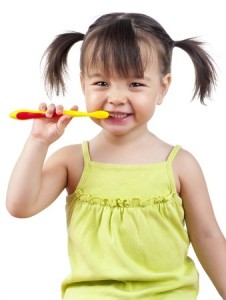 According to the World Health Organisation statistics, worldwide, there are 60% – 90% of school children who have dental cavities, which means that for every 10 children, 6 to 9 children have dental cavities.
According to the World Health Organisation statistics, worldwide, there are 60% – 90% of school children who have dental cavities, which means that for every 10 children, 6 to 9 children have dental cavities.
It is not uncommon for parents to neglect the importance of “baby teeth” (deciduous teeth) as the mindset is that these teeth will fall off eventually. However, care of deciduous teeth from brushing to cavity prevention should not be taken lightly.
Your child’s first milk tooth emerges as young as 5 months old. By preschool, all milk teeth would have erupted and by this time, your child should have visited a dentist or a Paedodontist (Specialist in children’s dentistry) more than once.
All deciduous teeth have a certain lifespan before the permanent teeth emerge. It is important to have the deciduous teeth as long as possible. Besides being important for mastication (chewing) and appearance, milk teeth will guide your child’s future permanent teeth to grow in an upright manner.
Sugars in food and drinks are the culprits and the bacteria’s source of energy for the acids to formulate cavity(s) on the tooth surface. As such, a child’s diet is equally important in the prevention of cavity.
Besides limiting consumption of the obvious chocolate bar and carbonated drink, take note of the sugar content in pre-packaged items. Many food and drinks popularly thought to be healthy actually have high sugar content – for instance, bottled fruit juices and sauces (eg. ketchup and spaghetti sauces), pudding cups, dried fruits, breakfast cereals and flavoured yoghurt.
Apart from keeping a low-sugar diet, parents should inculcate good oral hygiene in their child/ children. Here are some pointers to take note:
- Stop the use of the pacifier and night milk bottle feed from 12 months old onwards. Even if night feed habit cannot be changed immediately, try to schedule the last milk feed
closer to night time but not disrupting the child’s sleeping pattern. - Bring your child/ children to visit the dentist once their deciduous teeth emerge. This is to ensure that any dental issues will be addressed. At the same time, the Paedodontist will be able to provide guidance and advice to the child on how to take care of his / her teeth.
- Make visiting the dentist a routine activity, once every 6 months.
- Make it a fun activity with your child to brush and floss teeth together, at least twice a day.
- Use fluoride toothpaste as soon as the first tooth erupts at around 6 months of age
Good oral hygiene starts young so let’s start your kids to better oral hygiene habits today!
Please subscribe to our blog for more interesting dental related topics or ‘Like’ our Facebook page for the latest updates on our team activities.





